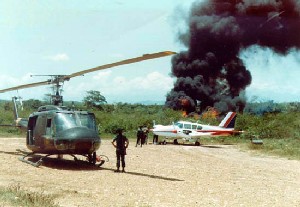Feature:
In
Colombia,
The
More
They
Spray,
The
More
They
Grow
4/21/06
After spending nearly $5 billion to wipe out Colombia's coca crops since President Clinton initiated Plan Colombia (now known under President Bush as the Andean Initiative), the US is right back where it started. Despite record levels of aerial spraying of Colombian farmers' coca crops last year, the US government's annual survey of the crop showed that Colombia had 144,000 acres (556 square miles) of coca being cultivated, a 26% increase over the previous year. While below 2001's peak of about 160,000 hectares, the figure is higher than when Plan Colombia began and higher than any years except 2001 and 2002.
The White House Office of National Drug Control Policy (ONDCP), which released the figures late on Good Friday (late Friday afternoon press releases are a time-honored tactic used by government agencies seeking to minimize attention) tried to put the best possible spin on the numbers, explaining that the area surveyed by satellites had increased and that cultivation in the previous years' survey area had actually decreased by 8% from 2004. "The higher cultivation figure in this year's estimate does not necessarily mean that coca cultivation increased in the last year," ONDCP said in a statement announcing the figures, "but rather reflects an improved understanding of where coca is now growing in Colombia." The statement does not mention that coca cultivation is migrating to new areas in Colombia precisely because US-backed eradication efforts in traditional coca growing areas are pushing farmers to seek new lands to plant their crops. Last year, a vast eradication campaign mainly consisting of aerial spraying with the herbicide glyphosate wiped out a record 170,000 hectares of farmland where coca was being grown. "If there really was a light at the end of the tunnel, as ONDCP's spin doctors would have us believe, do you think they would wait until Friday afternoon to unveil the 'good news'?" responded the Institute for Policy Studies' Sanho Tree, who has traveled to Colombia on numerous occasions and who will be leading a delegation there in August. "When government agencies have to release bad news, they wait until late Friday when all the journalists have gone home for the weekend to issue the press release. It's called 'taking out the garbage,'" he told DRCNet. "But this wasn't just any Friday afternoon -- this was Good Friday. They were forced to go to confession, but they wanted to make sure nobody but God heard them. John Walters can pray all he wants, but not even divine intervention can reverse the law of supply and demand. Coca cultivation is increasing because our policy of fumigation functions as an unintended price support for coca. In parts of the world where there is so much poverty and available land, we will never make illicit crops disappear by making them more valuable." "Six years and $4.7 billion after Plan Colombia began, and its utility has been absolutely zero," said Adam Isaacson, a senior policy associate at the Center for International Policy. "The US government has gotten no return on its investment and may even be behind where they started. That's because we haven't provided these farmers with any options except to move, clear land, and grow coca elsewhere," he told DRCNet. "If you're worried about crack in America's neighborhoods, this is really bad news," Isaacson continued. "To keep going with this spectacularly failed policy is almost immoral even within the confines of the criminalization of drug use; it has done nothing to reduce supply," he said. "These numbers are bad news for the administration," said Larry Birns, executive director of the Council on Hemispheric Affairs. "They try to put them in a context where they don't look so bad, but it's amazing that no one has really spoken out or that a significant and coherent congressional bloc doesn't come to the reluctant conclusions that the anti-drug campaign is a failure and we should be looking at legalization or other non-conventional approaches," he told DRCNet. But it is unlikely that Congress or the administration will radically change US policy any time soon. For the Washington drug warriors, Colombia's coca crop is not only a bane for US citizens because it constitutes nearly 90% of the cocaine that reaches the country, but also because some of the profits from the trade flow into the coffers of the leftist FARC guerrillas, helping it finance its decades-long insurgency against the Colombian state. Washington declared the FARC a terrorist organization in 2002, opening the way to directly going after the long-lived guerrilla army, and it declared the rightist paramilitaries terrorist organizations the following year. But given Washington's silence in the face of Colombia's failure to extradite paramilitary commanders indicted for drug trafficking in the US, the infiltration of paramilitary elements into the Colombian government's intelligence apparatus, and the "demobilization" that allows paramilitary leaders to keep their ill-gained wealth and suffer only the most meager punishments for their crimes -- including countless massacres and other human rights violations -- it appears that in Colombia, at least, some terrorists are more equal than others.
"The final defeat for the US drug strategy in Colombia -- that is, before these figures came out -- was giving up on extradition," said Birns. "That was shocking. The US didn't even bother to protest President Uribe's plan to use non-extradition as an inducement for the paramilitaries. The Justice and Peace Law that provides for their demobilization is transparently fraudulent, and the US will not even officially recognize that extradition is no longer a weapon. Meanwhile, the former paramilitaries aren't giving up the trade," he said. "Our policy in Colombia is one of the reasons why US diplomacy is now being called the sick man of Latin America," Birns continued. "If this had been a baseball player, he would have been sent back to the minor leagues. Our drug policy in Colombia is so stale and ineffective, it becomes a victory if you can maintain present levels of cultivation and distribution -- and they can't even do that! The administration can't possibly regard this as a success," he said. Au contraire. "The obvious question is, 'Is it working?' and I think the answer is obvious, ONDCP head John Walters told the Associated Press after the release of the cultivation numbers. "When there was no spraying, cultivation was up; where spraying is occurring, cultivation is shrinking." And the balloon effect continues, now with coca growing now radiating out from its traditional Colombian cultivation zones to the rest of the country. Along with the increased production in Peru and Bolivia, Colombia's increased cultivation means the Andean coca and cocaine industries are purring right along.
| |||||||||||||||||||||||||||||||||||||||||||||||||||||||||||||||||||||||||||||||||


